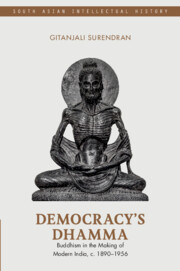Book contents
- Frontmatter
- Dedication
- Contents
- List of Figures
- Acknowledgements
- List of Abbreviations
- Introduction: Buddhism in the Making of Modern India
- 1 Anagarika Dharmapala in India
- 2 Dharmapala and Vivekananda in an Age of Universalism
- 3 Buddhism and The Bhadralok
- 4 The Buddhist Bay: Buddhist Mobility Across the Bay of Bengal
- 5 Buddhist Relics, The Mahabodhi Temple and The Discourse of a Shared Buddhism
- 6 Buddhism as a Civil Religion and Hindutva
- 7 Buddhism, Anti-Caste Radicalism and Socialism
- 8 Ambedkar, Dhamma and Democracy
- Conclusion: The Destinies of Buddhism
- Bibliography
- Index
Conclusion: The Destinies of Buddhism
Published online by Cambridge University Press: 28 November 2024
- Frontmatter
- Dedication
- Contents
- List of Figures
- Acknowledgements
- List of Abbreviations
- Introduction: Buddhism in the Making of Modern India
- 1 Anagarika Dharmapala in India
- 2 Dharmapala and Vivekananda in an Age of Universalism
- 3 Buddhism and The Bhadralok
- 4 The Buddhist Bay: Buddhist Mobility Across the Bay of Bengal
- 5 Buddhist Relics, The Mahabodhi Temple and The Discourse of a Shared Buddhism
- 6 Buddhism as a Civil Religion and Hindutva
- 7 Buddhism, Anti-Caste Radicalism and Socialism
- 8 Ambedkar, Dhamma and Democracy
- Conclusion: The Destinies of Buddhism
- Bibliography
- Index
Summary
A rich historiography of secularism (the doctrine of the separation of church and state) in India examines its fate as an essentially European Enlightenment export to the colonies. Indian secularism was a key component in the configuration of the relationship between nation, state and religion. Sumit Sarkar argues that secularism in India was seen as the other of communalism (mutual social, cultural and political antagonism between religions). The discourse of secularism that eventually became the distinct Indian one, that is, the state's equidistance and equal treatment of all religions, sprung from the needs of a united anti-colonial movement. Shabnam Tejani suggests that secularism was a bulwark for predominantly Hindu upper-caste male nationalists against challenges from the minorities, namely dalits and Muslims. Both ‘nationalist’ and ‘secularist’ became political positions with specific attributes, and any variance from these positions was deemed ‘anti-national’ or ‘communal’. What secularism was clearly not was a set of widely-agreed-upon human values that could endure various forms of national and regional crises.
Buddhism had the most ‘secularist potential’ through its denial of the existence of god, as T. N. Madan points out, though the history of Buddhism has more than revealed its political potential, where the world renouncer as monk is at a slightly higher plane than the world conqueror as king, while being mutually dependent. Many of the figures covered in the pages of this book did argue for Buddhism's secularist potential, that is, as a faith that was compatible with the modern age and modern politics while denying the existence of god. Buddhism was therefore more a philosophy rather than a religion.
Ashis Nandy's well-known formulation of the problem of secularism lays the blame at the feet of the Indian state and the elites that run it. The state regards religious ideology as its field of action and is unable to comprehend religion as faith. Elaborating on this in a similar way, Nandini Chatterjee, Anuradha Needham and Rajeshwari Sunder Rajan view the transition from religion to community—that is, religion as a guide to salvation to a political community with a bundle of rights—as the key transformation here. In India, as mentioned in Chapter 8, Buddhism's political community came with the dalit conversion in 1956 and after.
- Type
- Chapter
- Information
- Democracy's DhammaBuddhism in the Making of Modern India, c. 1890–1956, pp. 312 - 316Publisher: Cambridge University PressPrint publication year: 2025

